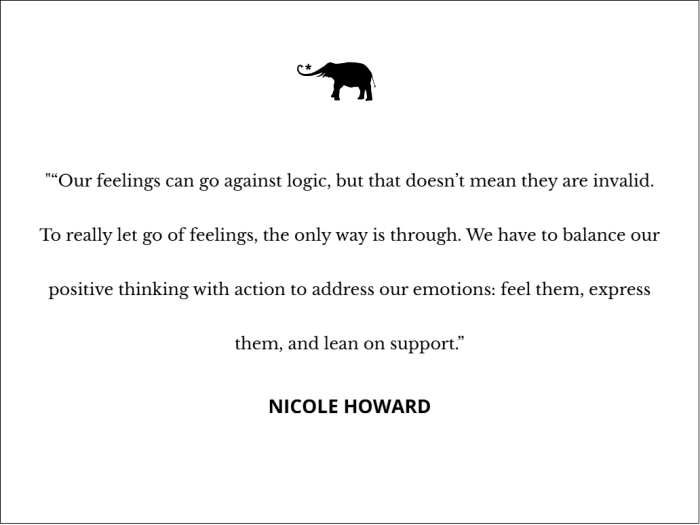
Before I found mindfulness, my emotions and reactions were all over the place.
But since I began practising regularly, I’ve experienced some major benefits that minimise the impact of my feelings. Emotional regulation, awareness, and acceptance—to name a few. The resilience I developed has been transformative, cultivating a positive mindset to help me through problems.
But an equally important lesson I have learned is that it is key to appreciate emotions for what they are, rather than invalidating them with positivity.
Sometimes, we have feelings that are tough to reconcile, particularly when they go against logic. But they are still there, and happening, even if they do not align with our positive thinking.
We shouldn’t ignore them.
If we don’t take steps to recognise, connect with, and process our emotions, they stay inside of us. Emotional repression can cause all sorts of ill-health and problems. This is a result of toxic positivity—neglecting emotional needs because we believe we should always be positive.
So, instead, it’s important to find balance between thinking positively and addressing our emotions. Here is how I do that by pairing acceptance with action.
Becoming ok with how I feel—no matter how “silly” it is.
I learned from mindfulness that emotions are not something I become, but things that happen to me. With mindfulness, we can create some separation with our emotions—space we need to control them, process them, and react productively.
But being able to regulate doesn’t mean our emotions aren’t real. They might often be a little irrational, but that doesn’t make them unnatural or bad.
Take self-doubt, for example—thoughts about never meeting our goals or being good enough. We say to ourselves, “Stop being silly.” or “I just have to get on with it.” The feeling conflicts with the logic, so we pass it off as invalid and treat it with some toxic positivity.
But we will always have moments when we feel self-doubt (for me, it’s usually when I am tired!). It’s natural. They might not pair up with the positive mindset, but these feelings are still real.
Feelings can often conflict with logic, and sometimes with each other. I like to think of my emotions as an army of little children inside of me. They’re not always going to agree with my core beliefs, or with each other, but they deserve some attention and resolution.
Expressing myself instead of bottling it up.
In fact, I felt some self-doubt this week. “Have confidence in yourself.” I say, and “You’ll be able to do it when the time comes.”
It isn’t that these statements are not true or helpful. Positivity is supportive for confidence and the beliefs we have about ourselves are key to success. But positivity isn’t enough to address the psychological stress we feel from self-doubt, or other emotions.
When we start to ignore our emotions, when we banish them as silly thoughts, we stop being able to feel the emotion. We confirm to ourselves that it’s not a big deal—a downward spiral of toxic positivity, that we’re not even aware is happening.
No emotion is too small to express. I said to a loved one how I was feeling frustrated, thinking “What if I can never…” Even though I know tomorrow is a new day, I will be ok, this is how I feel right now.
And guess what—I felt instantly better. It was like being sick after a period of feeling nauseous, and everything lifting. It brought my attention to how moody and closed off I was before I brought it up, and it was solved in a simple expression.
We don’t have to rant loads, but adding language to our emotions can diffuse them.
Recognising the value of my support network.
When we’ve become good at being positive, there is a risk that we don’t turn to others for their support. Why would we need advice, when “things aren’t that bad?”
We miss out on many benefits if we replace human connection with positive thinking. Firstly, our loved ones might have some decent advice. But it can also be impactful to hear things out loud from somebody else.
Positive social interaction relaxes our nervous system. Enhance this further with feelings of love and connection, those positive emotions can mitigate the effects of the negative ones: actual positivity. Can positive thinking alone do that?
If you’re invested in my example, the response from my loved one was a beautiful one—there is nothing quite like feeling my people care for and support me!
The only way is through.
If we want to have better control of our emotions, minimise their impact, and let them go, then the only way is through. Emotions are processes that need completing. Let’s not let toxic positivity hold us back from doing that. Feel them, express them, and lean on your loved ones.


This account does not have permission to comment on Elephant Journal.
Contact support with questions.